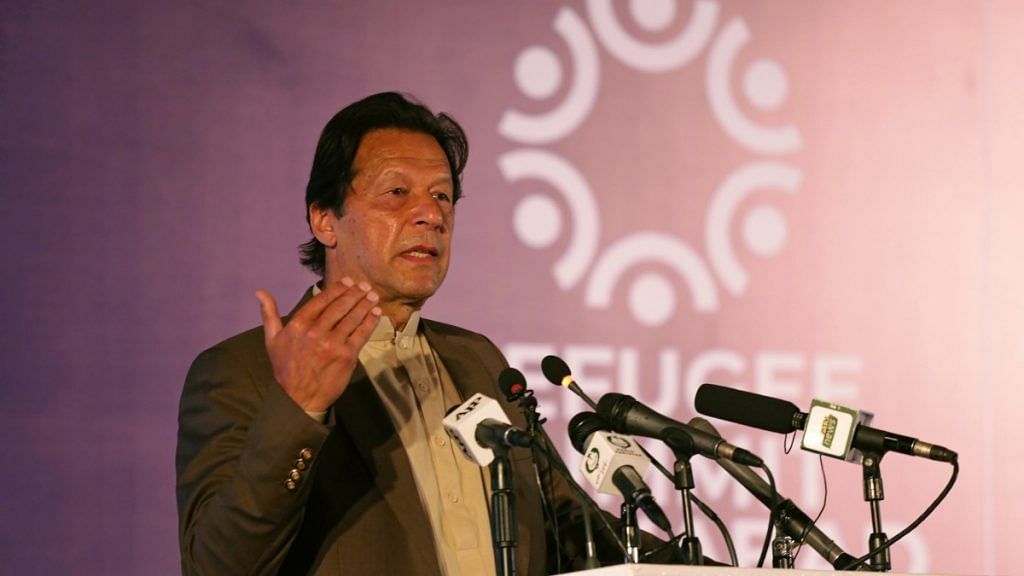New Delhi: In an op-ed for Pakistani daily The Express Tribune Monday, Pakistan Prime Minister Imran Khan said the most urgent challenge facing his country is the struggle to establish the rule of law. He also alleged that an “apartheid rule of law” has led to poverty and insurgencies in India.
“The most urgent of all challenges facing our country right now is the struggle to establish the rule of law. Over the last 75 years of Pakistan’s history, our country has suffered from elite capture, where powerful and crooked politicians, cartels and mafias have become accustomed to being above the law in order to protect their privileges gained through a corrupt system. While protecting their privileges they have corrupted state institutions,” he wrote.
Khan said Pakistan must embody the five guiding principles of the state of Madina (i.e. the Islamic version of a welfare state) built by the Prophet Muhammad: unity, rule of law, strong moral and ethical foundations, inclusivity, and the quest for knowledge.
He also emphasised that the National Rahmatul-lil-Alamin Authority (NRA) — a body of scholars formed last October and tasked with finding ways to disseminate lessons from the life of the Prophet to the masses — will play a key role with regard to the third principle: strong moral and ethical foundations.
“NRA will endeavour to engage in amr bil maroof by teaching seerat-al-nabi (SAW) to our youth in schools and universities in the hope to raise the level of ethics and morals in our society,” he wrote.
Amr bil maroof refers to encouraging people to do what is good, and seerat-al-nabi refers to biographies of the Prophet.
India’s ‘apartheid rule of law’
Khan claimed that the most successful states have the most “robust application” of the rule of law, citing Japan, China, South Korea, and western nations as good examples in contrast to India, Pakistan, and countries in Africa and Latin America.
“In many countries of the Muslim world, despite the prevalence of tremendous resources, there is less progress, which is attributable to lack of rule of law… In today’s India, the apartheid rule of law has immediately brought about poverty and countless insurgencies that threaten the union of their country,” he wrote.
“In Pakistan, not adhering to the rule of law has led to siphoning off of billions of US dollars which has imposed collective poverty on our public. The pattern of politics and development in many countries of Africa and Latin America suggest the same. The so-called banana republics are the way they are because of lack of rule of law,” he added.
Also read: If Pakistan doesn’t value work of non-Muslims like Har Gobind Khorana, science will remain dead
‘State can’t be neutral in ethical development’
Khan emphasised the role of the state in securing “ethical development” among the people, a reference to the third principle: strong moral and ethical foundations.
“There are elements in our society that are of the opinion that ethical development of people should be left to the people, the state should remain neutral about good and evil as conceived by religion,” he wrote.
“This approach is quite outmoded and problematic because it handcuffs the state from performing its ethical and moral duties and allows adversaries of the country to come in with handfuls of money and subvert our values using our own educational systems and channels of information,” he added.
The concept of amr-bil-maroof-wa-nahi-anil-munkar (doing good, forbidding evil) is critical as the Quran declares it the “defining mission for the Ummah”, he further stated.
Western model of welfare states not ‘possible nor desirable’
With regard to the principle of inclusive development through creation of a welfare state, Khan offered a caveat: welfare states modelled after the West are “neither possible nor desirable”.
“Most of the western welfare states were not sustainable environmentally because these were very high consumption societies that produced enormous waste. If the whole of non-West were to copy these welfare states, then our pattern of production, consumption and waste would resemble theirs, and by some estimates it would require us six more planet Earths to act as sinks that would absorb our waste,” wrote Khan.
Instead, he suggested that “only moderate prosperity and consumption would be ideal”, with universal healthcare and education.
With regard to the need to create a knowledge-based society, Khan said people must not “confound literacy with knowledge”.
He wrote: “Literacy alone may not be sufficient for a happy society. Knowledge with spiritual transformation from cradle to grave is important.”
(Edited by Rohan Manoj)
Also read: Pakistani passport ranks lower than North Korea’s. Twitter says Thank you, Imran Khan
